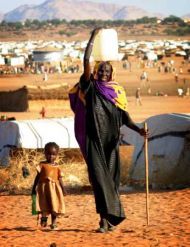Sudanese govt says it accepts rebel political demands on Darfur
ABUJA, Nigeria, Oct 31, 2004 (AP) — Sudan’s government expressed optimism Sunday on reaching a long-term political solution to the crisis in its Darfur region after listening to a rebel group’s proposals.

|
|
A displaced Sudanese woman carries water October 31, 2004 at the Abushouk camp near El Fasher, the capital of North Darfur province. |
The smaller of the two rebel groups represented at the African Union-brokered talks in the Nigerian capital Abuja made a “declaration of principles” at a session on Sunday, calling for greater representation at the national level and more local powers for Darfur.
The Justice and Equality Movement’s proposals went further than plans for devolution of power presented earlier in the week by the government.
Justice and Equality Movement spokesman Ahmed Hussain Adam said his group’s proposals concentrated “on the real issues: the political marginalization, the economic marginalization and the social marginalization” of ethnic groups from Darfur.
He said the government’s proposals for devolved powers to Darfur’s three states — including their own elected parliaments — were “empty statements.” He called for Darfur’s ethnic groups to be represented in Sudan’s presidency, and for the restructuring of the army and the civil service to include more people from Darfur and other regions.
“I think the demands being made are all reasonable and acceptable,” said Abdel Rahim Kalil, the Sudanese ambassador to Nigeria and a member of Sudan’s delegation at the talks.
“We believe all the regions of Sudan need to be adequately represented at the federal level,” he added.
The United Nations has called Darfur the world’s worst humanitarian crisis and said it has claimed at least 70,000 lives since March — mostly through disease and hunger — while 1.5 million have fled their homes since February 2003. No reliable figures are available for those killed by violence.
The Sudanese government has said the U.N.’s death toll is hugely exaggerated, putting the toll at around 7,000.
The larger of the two rebel groups, the Sudan Liberation Army, said fresh bombing raids by the Sudanese army in Darfur were imperiling moves toward peace.
The group’s spokesman, Mahgoub Hussain, said Sudan’s army bombed the village of Kafott in North Darfur late Saturday, using helicopters and Russian-made Antonov aircraft.
Hussain warned that the Sudan Liberation Army could counterattack, saying: “My army is ready for anything.”
Officials from the Sudanese government and an African Union-backed cease-fire commission were unavailable for comment.
Sudan’s government and rebels signed a cease-fire agreement in April but it has failed to hold.
The Sudan Liberation Army said it was not ready to compromise on some of its key demands, including its call for a secular state. This should include doing away with Sudan’s Islamic legal code, said Hussain.
“We need to separate religion and the state,” he said. “I am serious about that because that is the real problem in Sudan.”
The Islamist-oriented Justice and Equality Movement made no mention of the role of religion in a future Sudan, saying after its presentation that it was an issue “to be tackled by all the Sudanese people” at a later date.
Sudanese government spokesman Abdulrahman Zuma said Shariah would remain in force in Sudan.
The Sudanese people have “chosen Shariah law to govern their land,” he said.
